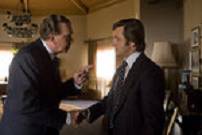|
|
||||
|
|
by John P. McCarthy  Whether they take the form of a boxing match, a gunfight, a cross-examination, or a cop nabbing a crook, one-on-one confrontations are a staple of scintillating drama in every medium. The engrossing movie Frost/Nixon arrives via the theater, by way of television and real life. In 1977, the disgraced 37th President of the United States agreed to sit down with British television presenter David Frost for thirty hours of videotaped interviews that would be culled into four ninety-minute episodes of landmark public affairs programming. After resigning in 1974, Richard Nixon had retreated to his home in San Clemente, California to lick his wounds and write his memoirs. He had yet to offer a public explanation or apology for any of the criminal wrongdoing he committed or that was carried out by his administration and re-election campaign. The only Commander-in-Chief to ever resign from office, "Tricky Dick" was pardoned by his successor Gerald Ford and began a long period in the wilderness, far from the Eastern corridors of power that he had fought so hard -- and so crookedly -- to enter and remain within. British writer Peter Morgan, Oscar-winner for The Queen, premiered his play in London before bringing it to Broadway, where it won multiple Tony awards. Based on the interviews themselves, plus various insider perspectives, its essence was a showdown between the two men (on and sometimes off camera), jousting to get the rhetorical (and psychological) upper hand. Nixon's goal was to take the first step toward rehabilitation by highlighting aspects of his tenure that were positive, while saying little about Watergate or touchy subjects such as the Vietnam War. Getting the President to open up, let alone accept culpability for Watergate, would constitute a coup for Frost, who had a playboy reputation and was considered a lightweight journalist. Despite being built around the stuff of good drama, it wasn't obvious that the play would make a good movie. Morgan incorporated various audio-visual devices into the stage production, but this episode in the life of arguably the least telegenic and charismatic president imaginable required massaging. Enter director Ron Howard, whose popularizing, mainstream sensibility is just what the play needed to make a compelling transition from stage to screen. The conventions he employs to get Morgan's scenario flowing are familiar but not hackneyed. The meat of the play remains, broken down into bits that are easily digestible inside the multiplex. And although first and foremost Morgan's baby and among Howard's strongest directorial efforts, Frost/Nixon really belongs to Frank Langella and Michael Sheen, who reprise their roles as the politico and his Gucci-shod inquisitor. Not only does the material have historical import, it affords these two excellent actors a classic sparring opportunity in another medium. Look for Langella to be the frontrunner in the derby for Best Actor Oscar. Much like in The Queen, from which British Prime Minister Tony Blair (portrayed by Sheen) emerged smelling like a rose, Frost is the ostensible hero. Yet in Langella's masterful hands, even Nixon has a certain morose charm. He proves alluring in his own sad and paranoid way. As it builds toward their climactic exchange over Watergate, the stonewalling, mind games, and maneuvering are riveting. The dynamic between the two adversaries, who ended up helping one another immensely, becomes one of sinner uncle and confessor nephew. A late-night, drunken phone call Nixon makes to Frost on the eve of their final interview reveals volumes about his dark and vulnerable side. The viewer watches and listens, mouth agape. Without employing any gimmicks, Howard and his cast -- including Sam Rockwell and Oliver Platt as Frost's researchers James Reston Jr. and Bob Zelnick, and Kevin Bacon as Nixon aid Jack Brennan -- ably represent both corners in the fight. They turn Frost/Nixon into high drama on film, just as it was on stage, on TV and in real life. (Released by Universal Pictures and rated "R" for some language.) |
||
|
© 2025 - ReelTalk Movie Reviews Website designed by Dot Pitch Studios, LLC |



